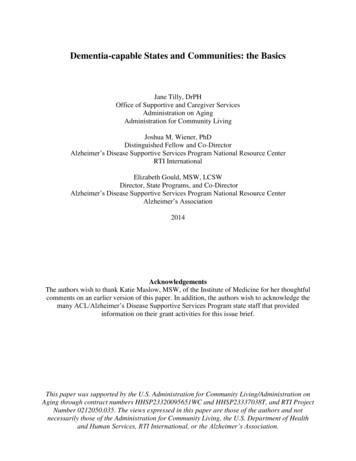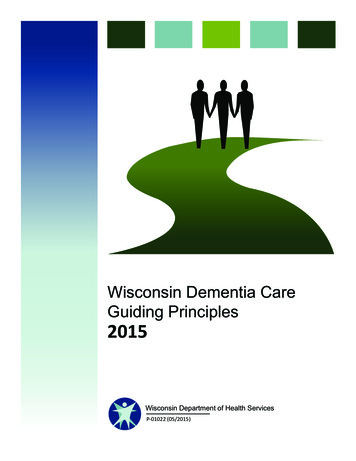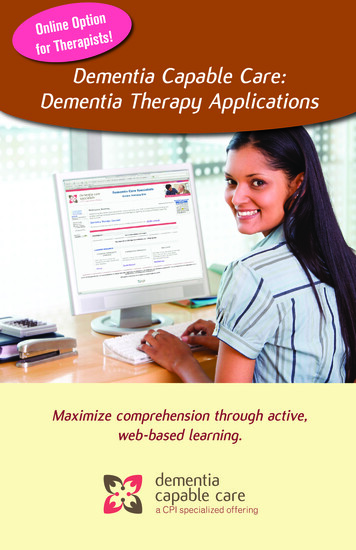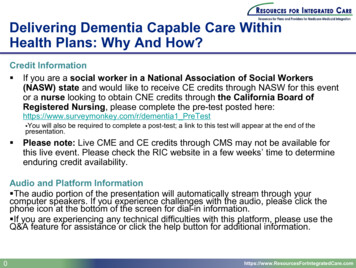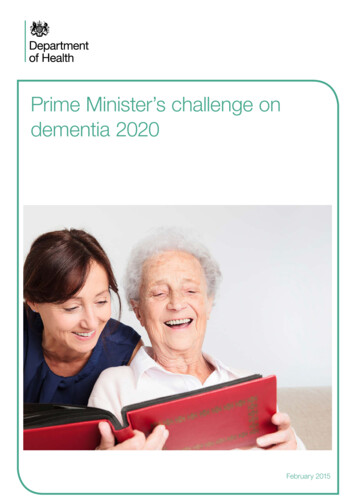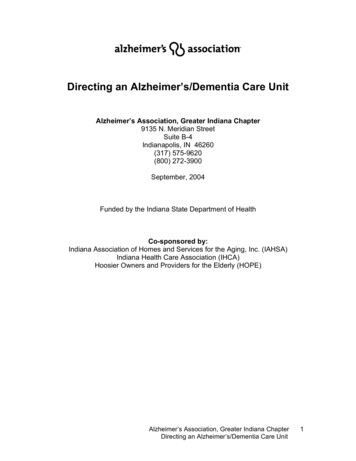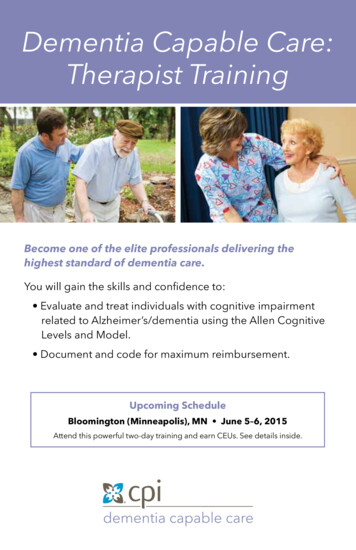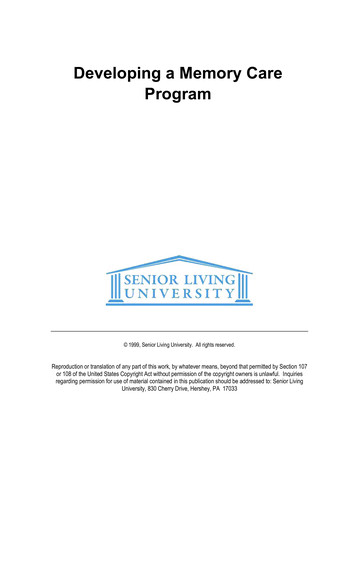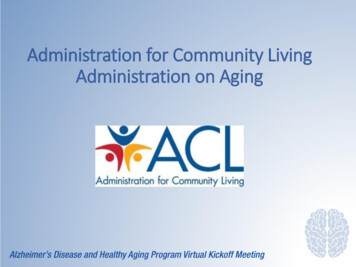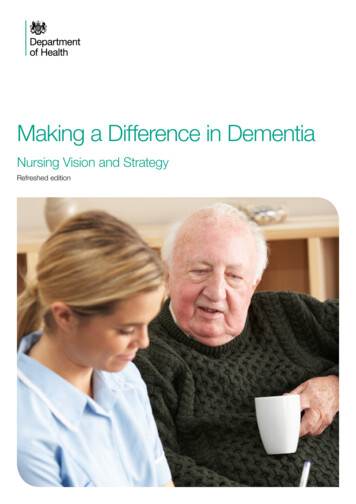
Transcription
Making a Difference in DementiaNursing Vision and StrategyRefreshed edition
Title: Making a difference in Dementia: Nursing vision and strategy refreshed editionAuthor:Nursing, Midwifery & Allied Health Professions Policy Unit,Quality Division, Strategy and External Relations Directorate32400Document Purpose:PolicyPublication date:September 2016To be reviewed in 2 yearsTarget audience:Registered nurses; Directors of Nursing; Staff working in health and social care services;Chairs and members of local safeguarding adult boards; Lecturers and those who deliverprofessional training.Contact details:Dr Ben ThomasMental Health, Learning Disability and Dementia Care Professional OfficerNursing, Midwifery & Allied Health Professions Policy UnitStrategy and External Relations DirectorateDepartment of Health,79 Whitehall, London, SW1A 2NSEmail: ben.thomas@dh.gsi.gov.ukYou may re-use the text of this document (not including logos) free of charge in any format ormedium, under the terms of the Open Government Licence. To view this licence, visit cence/ Crown copyrightPublished to gov.uk, in PDF format only.www.gov.uk/dh
Contents 3ContentsIntroduction5Part one: Refreshing our vision6Dementia facts6The 2010 Dementia Challenge6Compassionate practice7Part two: The role of the nurse in dementia9The nurse’s role9A new vision for the nurse’s role in dementia10Dementia Core Skills Education and Training Framework11Research12Nurse’s role within all phases of dementia12Part three: Guidance and resources16Guidance documents16Resources18
4Making a Difference in Dementia: Nursing Vision and Strategy Refreshed
Introduction5IntroductionThe Making a Difference in Dementia: NursingVision and Strategy, published in March 2013,set out our vision of how nurses couldmaximise their unique contribution to highquality, compassionate care and support forpeople with dementia and their carers/families. In the past three years a great dealhas been achieved, including the following: There has been a continued increase indementia awareness, with more than515,967 NHS staff at the end of March2015 completing Tier 1 training to bettersupport people with dementia. Tier 1training continues to be rolled out, with aview to reaching all NHS staff by the endof 2018. The publication of the DementiaCore Skills Education and TrainingFramework in October 2015 will help us toachieve this goal, by assuring the qualityand consistency of dementia training forall health and care staff. More than one million people havebecome Dementia Friends acrossEngland. The Alzheimer’s Society’sDementia Friends programme is thebiggest ever initiative aimed at changingpeople’s perceptions of dementia,transforming the way we all think, act andtalk about dementia, to help improveawareness and understanding. DementiaFriends are helping to create communitiesin which people living with dementia feelmore understood and included. The 2020 Dementia Challenge, publishedin February 2015, builds on theachievements of the previous 2012–15Challenge. It identifies what needs to bedone by the NHS, social care, voluntary,community sectors and society at large, tomake sure that dementia care, support,awareness and research are transformedby 2020. The 2020 challenge focuses onrisk reduction, health and care, continuinginvestment in research and expansion ofdementia-friendly communities. The Implementation Plan published inMarch 2016, sets out priority actions toensure that the commitments set out inthe 2020 Dementia Challenge aredelivered.The spirit and values set out in Making aDifference in Dementia: Nursing Vision andStrategy remain as relevant today as threeyears ago. We want to build on these, whileappreciating that emerging challenges requirea fresh approach. This refreshed edition ofMaking a Difference in Dementia: NursingVision and Strategy reinforces thefundamental role nurses play in providinghealth promotion, care and support to peopleso they can live well with dementia. It aims tosupport all nurses, irrelevant of registration orspecialty, to be responsive to the needs ofpeople with dementia, continue to developtheir skills and expertise, and improve thecontribution they make in achieving bestoutcomes for people with dementia, theircarers and families, and communities.
6Making a Difference in Dementia: Nursing Vision and Strategy RefreshedPart one: Refreshing our visionDementia factsDementia is not an inevitable part of ageing.However, as our population ages, the numberof people living with dementia is set toincrease. There are around 676,000 peoplewith dementia in England, and this number isexpected to double in the next 30 years.Dementia mainly affects older people, thoughit can start before the age of 65.People with a learning disability are at a muchhigher risk than the general population. Forexample, people with Down’s syndrome aged50-59 have a one in three chance of havingdementia.Dementia is progressive. Initial symptomsinclude memory loss and difficulties withthinking, problem-solving or language. Themost common types are Alzheimer’s disease,vascular dementia, frontotemporal dementiaand dementia with Lewy bodies.Timely diagnosis along with support andtreatment are helping more people withdementia stay active and independent; andyounger people to stay in work for longer.Dementia affects people differently and thelevel of support required will vary. It is importantto recognise that no two people with dementiaor their carers are the same, and individualswill have unique and differing needs.There are around 540,000 carers of peoplewith dementia in England. Half of them areemployed and it is estimated that 66,000people have already cut their working hoursto make time for caring, while 50,000 peoplehave left work all together.The 2020 Dementia ChallengeThe 2020 Dementia Challenge aims totransform dementia care, support andresearch.By 2020 England should be: the best country in the world for dementiacare and support and for people withdementia, their carers and families tolive; and the best place in the world to undertakeresearch into dementia and otherneurodegenerative diseases.The Government’s key aspirations include: improved public awareness andunderstanding of the factors whichincrease the risk of developing dementiaand how people can reduce their risk byliving more healthily in every part of the country, people withdementia having equal access todiagnosis as for other conditions every person diagnosed with dementiahaving meaningful care following theirdiagnosis, which supports them and thosearound them, with meaningful care beingin accordance with published National
Part one: Refreshing our visionInstitute for Health and Care Excellence(NICE) quality standards. This care mayinclude, for example:– receiving information on what postdiagnosis services are available locallyand how these can be accessed– access to relevant advice and supportto help and advise on what happensafter a diagnosis and the supportavailable through the journey– carers of people with dementia beingmade aware of and offered theopportunity for respite, education,training, emotional and psychologicalsupport so that they feel able to copewith their caring responsibilities and tohave a life alongside caring all NHS staff having received training ondementia appropriate to their role all hospitals and care homes meetingagreed criteria to become a dementiafriendly health and care setting an increase in the numbers of people ofBlack, Asian and Minority Ethnic originand other seldom heard groups whoreceive a diagnosis of dementia, enabled7through greater use by health professionalsof diagnostic tools that are linguistically orculturally appropriate dementia research as a career opportunityof choice, with the UK being the bestplace for dementia research through apartnership between patients,researchers, funders and society.The contribution of all registered nurses toachieving this vision is crucial given that theyhave regular contact with patients. Nurses arein a unique position to provide every personwith dementia – and their carers and families– with high-quality, compassionate care fromdiagnosis through to end-of-life care.Compassionate practiceLooking at the person with dementia, anddementia itself, with a fresh vision shapes thenurse’s role and characterises it as personcentred, compassionate and proactive.If dementia is seen as a long-term condition,it can be divided into phases, which helpsarticulate where the person might be in theprocess and how nurses can provide excellentnursing care and support. These phasesoverlap and are not necessarily distinct oralways sequential, but they provide a frameworkfor understanding and timely action.Person with dementiatraditional view an older person who is considered incapableof making decisions and going outprevalent view a person living well with dementia – with a lifestory, family, community and social network, whowill need help and changing levels of support asthe condition ebbs, flows and progresses
8Making a Difference in Dementia: Nursing Vision and Strategy RefreshedThe phases reflect the experiences of peopleliving with dementia, from recognising thatthere might be memory problems through tolearning about how best to live well with thecondition, preventing and managing crises,and reaching the end of life with dignity andcompassion. The phases are also relevant topartners, carers and families.Dementiatraditional view a debilitating conditionprevalent view a long-term condition affecting memory,cognitions, health and behaviour experiencedby the person and their family/carersthat can benefit from proactive planning,timely treatment, support andcompassionate carePhases of dementia: a frameworkPhase 1Phase 2Phase 3Phase 4Phase 5Phase 6When memoryor other problemsprompt theperson or carer/family to voiceconcernsLearning thatthe conditionis dementiaLearning moreabout dementia,self-management,options fortreatment, careand supportGetting the righthelp at the righttime to live wellwith dementia,prevent crises,and managetogetherGetting help tostay at homeor if neededmove toalternative careaccommodationReceiving care,compassionand support atthe end of life
Part two: The role of the nurse in dementia9Part two: The role of the nurse in dementiaThe nurse’s roleOur refreshed vision defines the nurse’srole as: interpersonal varied in action and intensity taking place in a variety of settings welcoming individuals, family, significantothers and carers and respecting theirdiversity and cultureto ensure that all registered nurses are ableto deliver safe, high-quality, compassionatecare within all care settings, including aperson’s own home.The vision for the nurse’s role in dementia isprimarily an interpersonal and social model ofcare. This is not new, but applying it in practicealong with the medical aspects of carerequires a person-centred approach andcommitment. Regardless of the setting or thenurse’s registration or speciality, theinterpersonal and psycho-social model ofcare in dementia includes: understanding the unique experiences ofa person living with dementia building and maintaining a relationshipwith the person and their family respecting the person and their family andtreating them with dignity andcompassion, taking account of theirculture – this is especially important whensupporting people from ethnic minoritycommunties recognising the person for who they areand taking the time to understand their lifestory, interests, preferences, wishes, socialnetworks, and strengths and abilities developing person-centred outcomes withthe person and their family that recogniseand anticipate the phases of the condition promoting and providing a dementiafriendly environment seeking alternative sources of support,including signposting to non-medicalservices, if unable to provide directassistance identifying and reporting any potentialform of abuse that the person withdementia may be going through.
10 Making a Difference in Dementia: Nursing Vision and Strategy RefreshedA new vision for the nurse’s role in dementiaNurses have a key role in providing health education to promotehealthy lifestyles that reduce the risks of developing dementia andsupport people to remain active and live wellNurses work within an interpersonal and psycho-social model,understanding the effects of dementia and having the skills tocommunicate with individuals and their family/carersAll nurses undertake dementia education or training to supportdevelopment of their knowledge, skills and expertiseNurses on all parts of the nursing register should be aware ofrelevant safeguarding protocols and how to refer vulnerable adults,in accordance with the Mental Capacity Act. This will ensure thatpeople with dementia have safe, effective, compassionate careThe nurse’s role includes welcoming and working in partnershipwith individuals, family and carers, respecting diversity and cultureThe nurse’s role varies in intensity and action depending on thephase of dementia and the person’s specific needsNurses have a leadership role in developing dementia-friendlycommunities and reducing stigmaNurses have an important role, regardless ofarea of registration.For example: Nurses have a critical, leadership role insupporting and promoting dementiafriendly communities. Most people with dementia will havemultiple long-term conditions, particularlyolder people. Nurses in primary andcommunity care have a role in identifyinghealth and wellbeing issues, such aseyesight and hearing problems, nonattendance at critical appointments andensuring adherence to medication. Most people with dementia will haveanother long-term condition so may be incontact with nurses working in otherspecialist fields such as diabetes. Often people with dementia are admittedto hospital. Nurses in hospitals have aresponsibility to recognise, understand,
Part two: The role of the nurse in dementia11respond to and support the needs ofpeople with dementia and their family/carers, promoting person-centred care.The framework sets out the core skills andknowledge that would be transferable andapplicable across different types of serviceprovision. It includes expected learning Nurses are able to offer practical adviceoutcomes for training delivery, key policy andand support to help people live as well as legal references and is aligned to relatedpossible with dementia, taking account of national occupational standards. The aim is totheir medical and non-medical needs. This help ensure the quality and consistency ofmay include liaising with different parts ofdementia training, and to help preventthe social care system and the voluntaryunnecessary duplication of training.sector, to carry out housing improvementsand adaptations, or to help individuals toThe framework is structured in three tiers andstay at home for longer.is applicable to the entire health and careworkforce, including registered nurses: Nurses working with people with alearning disability are able to support Tier 1: dementia awareness raising, incarers to be aware of symptoms ofterms of knowledge, skills and attitudesdementia, such as changes in behaviourfor all those working in health and careand personality (e.g. becoming moresettingsinflexible, frustrated or withdrawn) or loss Tier 2: knowledge, skills and attitudes forof daily living abilities. People with aroles that have regular contact with peoplelearning disability who develop dementialiving with dementiagenerally do so at a younger age, and thisis particularly the case for people with Tier 3: enhancing the knowledge, skillsDown’s syndrome, who tend to developand attitudes for key staff (experts)epilepsy as a symptom.working with people living with dementiadesigned to support them to playleadership roles.Dementia Core Skills Educationand Training FrameworkThis will ensure that all health and care staff,including nurses, can gain core skills andThe Dementia Core Skills Education andknowledge that can be used across differentTraining Framework, published in Octoberclinical areas and care settings, resulting in2015, was commissioned and funded by theincreased quality of care for people living withDepartment of Health and developed by Skills dementia and their families.for Health and Health Education England(HEE) in partnership with Skills for Care.Levels of nursing involvementSpecialist dementia nurses,Admiral Nurses, palliativecare nursesSpecialistskillsActive involvement,anticipate, understandand respondAll nursesAware, alert and dementia friendlyNurses working with peoplewith dementia in all caresettings, e.g. primary,secondary, community,independent and social care
12Making a Difference in Dementia: Nursing Vision and Strategy RefreshedResearchAll registered nurses need to be aware of therelevant and most recent research and becommitted to delivering evidence-based care.Nurses who lead and deliver care can betrained to become researchers, able to leadresearch on issues that matter most topatients and carers, and to deliver results intoclinical practice.Nurses should consider opportunities to bepart of the expanding dementia researchworkforce through: the National Institute for Health Research(NIHR) Collaborations for Leadership inApplied Health Research and Care(CLAHRCs), which train nurses, socialcare and allied health professionals tobecome dementia researchers the Health Education England (HEE) andNIHR Integrated Clinical Academic (ICA)Programme, which provides personalresearch training awards for healthcareprofessionals, including nurses, who wishto develop careers that combine clinicalresearch and research leadership withcontinued clinical practice and clinicaldevelopment the Alzheimer’s Research UKPhD Scholarship the Alzheimer’s Society’s networks ofDoctoral Training Centres across the UK.Nurses should also encourage patients andtheir families and carers to ask aboutresearch opportunities that could be availableto them – reassuring them that it is “OK toAsk” about dementia research opportunities.The NIHR-funded ‘Join dementia research’project aims to get 25% of those diagnosedwith dementia signed up to its database tomake themselves potentially available forresearch into dementia.Nurse’s role within all phases ofdementiaThe nurse’s role varies in intensity and actiondepending on the phase of dementia and thearea of nursing practice.
Part two: The role of the nurse in dementiaCritical aspects of the nurse’s role at different phases within thedementia phase 1: When memory or other problems prompt concernsAll nurses: are aware and alert to the signs, symptoms and progress of dementia understand and take account of other conditions a person may be living with andwhere they can access appropriate support signpost individuals to GP for assessment, to exclude all treatable causes ofobserved symptoms provide leadership and support to the development of dementia-friendly environmentsand communities, including in health and social care settings know about local memory assessment services and how to refer individuals – and beable to explain to the person and their family/carers how the service can helpindividuals to live with memory changes show compassion and understanding to those expressing concerns about memory,communication problems or other possible signs of dementia, including carersand family be aware and follow the Mental Capacity Act 2005 Code of Practice when actingor making decisions on behalf of someone who lacks capacity to make a decisionfor themselves.Critical aspects of the nurse’s role at different phases withinthe dementia phase 2: Learning that the condition is dementiaAll nurses: provide compassionate support to people who have been given a diagnosisof dementia are prepared to advocate on behalf of the person with dementia and/or their familyand carers know how dementia might affect the person, their family and carers, and their healthand care needs recognise the person as a unique individual and citizen with strengths as well as needs know how the condition might affect any co-existing condition (e.g. diabetes) and takethis into account in their practice to manage the person’s care safely, compassionatelyand effectively.Dementia or memory service nurses: work in partnership with colleagues in primary care and memory services to ensurethat the person has a timely diagnosis delivered compassionately and taking intoaccount their personal needs and circumstances.13
14 Making a Difference in Dementia: Nursing Vision and Strategy RefreshedCritical aspects of the nurse’s role at different phases withinthe dementia phase 3: Learning more about dementia, selfmanagement, options for treatment, care and supportNurses working in dementia or memory service: provide information and advice about living well with a diagnosis of dementia at a timeand in a way that the person wants engage with people from ethnic minority communities to ensure that people canaccess services and support that meet their needs work in partnership with the person to identify needs, preferences and outcomes know about local services, community resources and opportunities to enable peopleto get the support they need to live well with dementia support the person to overcome barriers and stigma seek out and know about imaginative and creative treatment and care options ensure that the person and their family and carers know who to contact in a crisis.Critical aspects of the nurse’s role at different phases within thedementia phase 4: Getting the right help at the right time,preventing crises and managing togetherNurses working in dementia services: work in partnership with the person, their family, carers and colleagues, to plan care,identify possible crisis situations and establish strategies to pre-empt or managethose crises work in partnership with colleagues and voluntary sector organisations, to identify acare coordinator to help the person and their family and carers navigate services work with the person and their family and carers to identify and articulate futureneeds, and, if wanted, support the family with lasting power of attorney and advancecare planning support the person to access psychological and other relevant therapies, includingexercise, creative therapies and meaningful activities relevant to the person’s interests liaise with other relevant services to ensure that they know about dementia, theperson, plans, possible crisis points and anything else that might affect their care understand carer needs and concerns, welcome and support the carer as a partnerin the care of the person with dementia ensure that physical health and care needs are identified and met.
Part two: The role of the nurse in dementiaCritical aspects of the nurse’s role at different phases within thedementia phase 5: Getting help to stay at home or, if needed,move to alternative care accommodationAll nurses working with the person: work with other relevant health, social care and voluntary sector services to enable theperson to remain at home and maintain their independence for as long as possible where possible work to prevent admission to an acute hospital work to enable safe, timely discharge from hospital, if admitted, making sure there isappropriate community support support the person and/or their family and carers in decision-making regardingalternatives to living at home work with care home colleagues, including providing training and supervision, toensure that the person receives compassionate and safe care, participates instimulating activities, and continues to live as well as possible.Acute hospital nurses: support the person with dementia on the ward or A&E with knowledge, understandingand compassion, ensuring that their particular needs are taken into account duringtheir treatment and care.Critical aspects of the nurse’s role at different phases within thedementia phase 6: Receiving care, compassion and support at theend of lifeAll nurses working with the person: work to understand and record a person’s wishes and preferences for end of life,including where they would like to die, and provide support to help achieve thesepreferences understand potential difficulties in communicating pain and distress, and work withmedical colleagues and others to ensure effective pain relief ensure good communication between palliative care, primary care and other relevantcolleagues and family and carers support the family and carers through the last days of the person’s life and signpostthem to relevant services and bereavement support.15
16 Making a Difference in Dementia: Nursing Vision and Strategy RefreshedPart three: Guidance and resourcesGuidance documentsCarers Trust and Royal College of Nursing(2013), The Triangle of Care: Carers Included:A Guide to Best Practice for Dementia e-dementia)Dementia UK – Admiral Nursing ursing)Department of Health (2009), Living Wellwith Dementia: A National Dementia partment of Health (2010), Recognised,Valued and Supported: Next Steps for theCarers strategy)Department of Health (2011), NationalDementia Strategy: Equalities Action mentia-strategy-equalities-action-plan)Department of Health (2015), Prime Minister’sChallenge on Dementia ters-challenge-on-dementia-2020)Department of Health (2016), Prime Minister’sChallenge on Dementia 2020: ystem/uploads/attachment data/file/507981/PM Dementia-mainacc.pdf)National Institute for Health and ClinicalExcellence (NICE) and Social Care Institute forExcellence (2006), Dementia: SupportingPeople with Dementia and Their Carers inHealth and Social CE, Dementia tia)NICE Guidelines [CG42] (2006), Dementia:Supporting People with Dementia and TheirCarers in Health and Social Care(www.nice.org.uk/guidance/cg42)Department of Health (2014), Care andSupport: Statutory Guidance: Issued underthe Care Act 2014NICE Guidelines [NG16] (2015), Dementia,Disability and Frailty in Later Life – Mid-LifeApproaches to Delay or Prevent e.org.uk/guidance/NG16)Department of Health (2015), Mental HealthAct 1983: Code of fpractice-mental-health-act-1983)NICE quality standard [QS1] (2010),Dementia: Support in Health and Social Care(www.nice.org.uk/guidance/qs1)
Part three: Guidance and resourcesNICE quality standard [QS30] (2013),Dementia: Independence and Wellbeing[quality standard for supporting people to livewell with dementia](www.nice.org.uk/guidance/qs30)17Royal College of Psychiatrists, National Auditof nalauditofdementia.aspx)Nuffield Council on Bioethics (2009), Dementia: Skills for Health, Health Education England,and Skills for Care (2015), The Dementia CoreEthical IssuesSkills Education and Training entia)Office of the Public Guardian (2016), MentalCapacity Act Code of ation-and-training-framework)
18 Making a Difference in Dementia: Nursing Vision and Strategy RefreshedResourcesAlzheimer’s Research UK, PhD dscholarship)Alzheimer’s Society, Dementia Friendsprogramme [initiative to change people’sperceptions of dementia](www.dementiafriends.org.uk)Alzheimer’s Society, FactsheetsAlzheimer’s Society, Doctoral Training Centres (www.alzheimers.org.uk/factsheets)[network across the UK](www.alzheimers.org.uk/dtc)Care Fit for VIPS [free online toolkit that offerseasy-to-use resources to understand andAlzheimer’s Society, Guidance and Criteria for implement person-centred dementia care]the Recognition Process for Dementia(www.carefitforvips.co.uk/#vips)Friendly nload info.Central and North West London (CNWL) NHSphp?downloadID 911)Foundation Trust (2016), Memory Services:Dementia Information for Black, Asian andAlzheimer’s Society (2012), Factsheet 500:Minority Ethnic tsheet/500)Alzheimer’s Society (2013), The DementiaGuide: Living Well(www.alzheimers.org.uk/site/scripts/documents info.php?documentID 2240)Alzheimer’s Society (2014), Factsheet 483:Deprivation of Liberty heimer’s Society (2015), Factsheet 430:Learning Disabilities and imer’s Society (2015), Factsheet 524:Understanding and Supporting a Personwith imer’s Society (2015), This Is Me [tool forpeople with dementia receiving lzheimer’s Society, Advice for Nurses andOther Healthcare ocuments info.php?documentID 1211)Alzheimer’s Society, Dementia UK: Update(2014 update d info.php?fileID vices-Handbook-final.pdf)Dementia Action Alliance [supportscommunities and organisations acrossEngland to take practical actions to enablepe
Difference in Dementia: Nursing Vision and Strategy remain as relevant today as three years ago. We want to build on these, while appreciating that emerging challenges require a fresh approach. This refreshed edition of Making a Difference in Dementia: Nursing Vision and Strategy reinforces the fundamental role nurses play in providing
